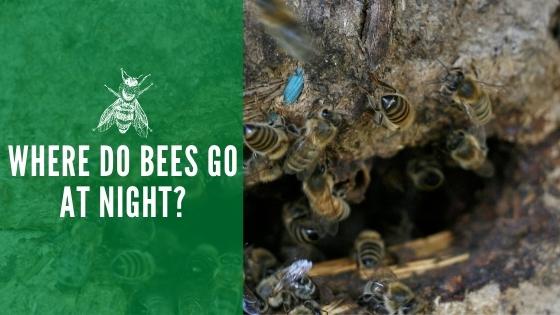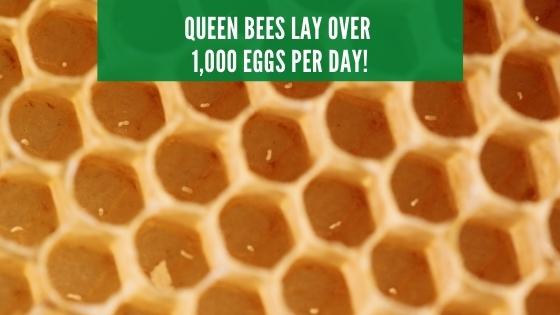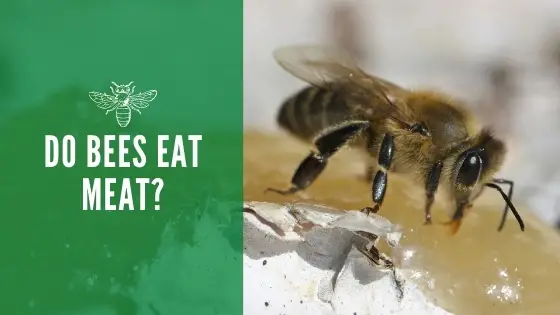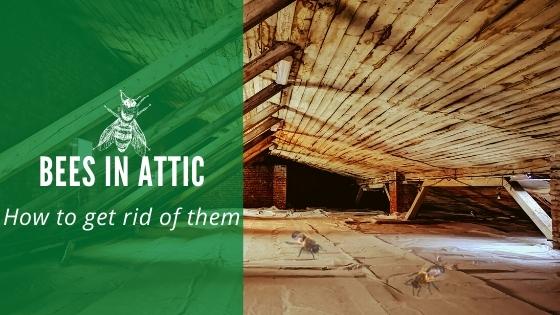Where Do Bees Go at Night?

Bees are fascinating creatures, and they play an important role in the environment. Did you ever wonder what they do during the day and where they go at night? Are Bees active at night?
What Do Bees Do All Day?
Before we explore what bees do all night, let’s explore what they do all day. The average honeybee works from a few hours to 12 hours a day, collecting nectar or pollen. They spend almost every daylight hour outside, working studiously to collect what is needed to sustain the hive.
Worker bees fall into two different categories. Some work outside the hive collecting pollen for the larvae. There are also those whose duties live within the hive. Those out collecting pollen may only work a few hours a day, but those inside the hive stay busy around the clock. They tend to honeycombs, fan their wings to keep the nest cool, and are in almost constant motion. Workers inside the hive do take frequent breaks.

Queen bees are usually relatively immobile as they lay from 1,000 to 2,000 eggs each day. Drones are the laziest of the bees. They do not leave the hive until early afternoon. They travel in packs and return a few hours later. The drones do not feed themselves but depend on the workers to feed them.
These are the average daily lives of bees, but some exceptions exist. Except for outside workers, most bees spend much of their time outside the hive and return at night. The other classes of bees spend more of their time inside the hive.
Where Do Bees Sleep at Night?
At night, bees return to the hive to rest and relax. One thing to note is that bees do not have eyelids, so they cannot close them to sleep. They go into a resting state where their muscles relax and their antennae slump. They stop moving after a day of continual movement.
Bees will stay in the hive, take the day off, and rest when the weather is not conducive to collecting pollen. They will remain in the hive if the temperature drops into the 50 and if it looks like rain. They will also remain in the hive if winds are above 15 mph. On cold days, bees huddle together to stay warm. As you can see, bees return to the hive at night, but some bees spend much of their day inside.
Do All Bees Return to the Hive at Night?
For the most part, bees and wasps return to the hive at night, except for Megalopta and some bees in South America. Most bees are inactive and resting inside the hive. The exception is the queen, who will lay eggs all night long, beginning when the nights are warmer in April or May.
Keep in mind that if you need to get rid of wasps or other bees, using products to get rid of them works best at night when all the bees are likely to be inside. Otherwise, you are likely to miss those outside the nest working. These bees will return to the nest and try to find a place to reestablish a hive.
Do Bees Attack at Night?
It is a common myth that bees will not attack at night. Most bees are asleep at night, but if they feel their hive is under attack, they will sting without hesitation any time of the day or night. If you decide to get rid of a bee’s nest at night, be sure to do it before the sun begins to rise. They are extremely sensitive to light, and even the slightest bit of light will wake them up. Even the light from a lamp or flashlight will wake them up.
Interestingly, most bees are diurnal, which means they are largely active during the day and sleep at night, but some bees are nocturnal. A few species of bees that inhabit the Central American rainforest are nocturnal and will do most of their activity at night.
It was found that nocturnal bees find their way around by learning certain landmarks around the hive. They have poor eyesight and cannot see in the dark. Scientists tested this by moving items around the bee’s nests to different locations. It seems that they relied on memory to navigate at night and could not find the hive if their landmarks were moved.
One species of wasps in Central and South America is nocturnal. Apioca wasps limit their activities to moonlit nights. They stay in the hive on dark nights with no moon and do not go out.
Now, you know a little more about what bees do during the day and the night. They lead interesting lives, and you cannot generalize their daily schedule and behavior. If you want to rid yourself of a hive, the best time to do it is at night, but keep in mind that they can, and will, still sting.
Source:
https://extension.psu.edu/an-introduction-to-queen-honey-bee-development
https://sciencing.com/happens-bees-wasps-night-8048139.html
https://slate.com/technology/2012/06/busy-as-a-bee-are-bees-really-busy.html




